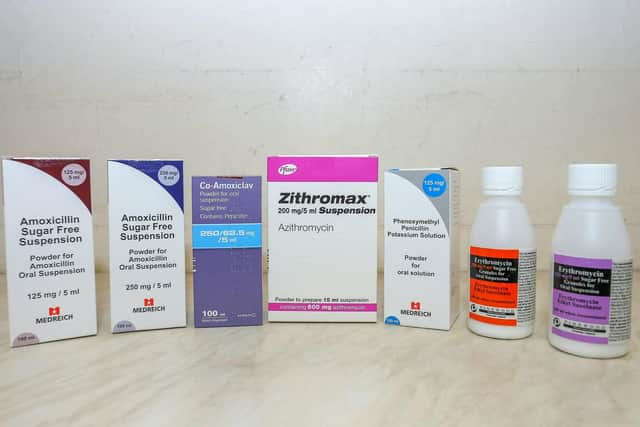Scottish Government warns antibiotics used to treat strep A are in short supply
According to Public Health Scotland (PHS), infections caused by Group A streptococcus (GAS) have been increasing in Scotland since the start of October.
Whilst GAS infections, which commonly present as scarlet fever, are common, the more serious Invasive Group A Streptococcal (IGAS) infections are rare.
Advertisement
Hide AdAdvertisement
Hide AdNow pharmacists have been warned the syrup versions of the antibiotics used to treat strep A in children are “temporarily in limited supply at certain wholesalers and pharmacies”.


A spokesperson for the Royal Pharmaceutical Society (RPS) Scotland said: “There has been a surge in demand for supplies of antibiotics for the treatment of Group A strep. Unfortunately, this means supply may be temporarily limited at certain wholesalers and pharmacies.
“Scottish Government advised on 14 December that supplies are available with manufacturers, and deliveries into wholesalers and pharmacies are being expedited. These are expected in the coming days.
“RPS Scotland understands how difficult and worrying the current situation is for patients, their families and pharmacy teams. Pharmacy teams are currently working extremely hard to source antibiotics for patients or to advise on alternative antibiotics.
“We ask the public to please be kind to our pharmacy teams as they work hard to resolve these issues at such a busy time.”


There were 967 laboratory reports of GAS in the week ending December 11, PHS figures show, well above the 300 to 480 reports a week during peaks observed in the period since 2016.
PHS received reports of six new cases of the more serious Invasive Group A Streptococcal infections (iGAS) between December 5 and 11 across all age groups in Scotland, with no new reports in children under ten since last week’s report.
Speaking at First Minister’s Questions on Thursday, Nicola Sturgeon said “nobody is burying their heads in the sand” on the antibiotic supply issue.
Advertisement
Hide AdAdvertisement
Hide AdShe was responding to a question from Scottish Conservative MSP Rachael Hamilton, who said doctors in her constituency in the south of Scotland have described the situation as “horrendous”.
Ms Sturgeon said powers over the supply of medicine were reserved to Westminster. She said: “We are of course aware of some localised supply problems with penicillin and amoxicillin liquid preparations due to the increase in demand across the whole of the UK.
“These types of demand shortages are not uncommon. The NHS has robust systems in place to deal with them. The assessment right now is that there is sufficient supply within the UK to meet these needs.”
Data from the UK Health Security Agency (UKHSA) shows 16 children under the age of 18 have died in England since September. Three other deaths of children have been recorded in Belfast and Wales, taking the UK total to 19.
It is understood that health officials do not believe the number of scarlet fever infections has yet peaked, suggesting more deaths are likely.
The UKHSA has said there is no current evidence that a new strain is circulating and the rise in cases is most likely due to high amounts of circulating bacteria and increased social mixing.
Comments
Want to join the conversation? Please or to comment on this article.